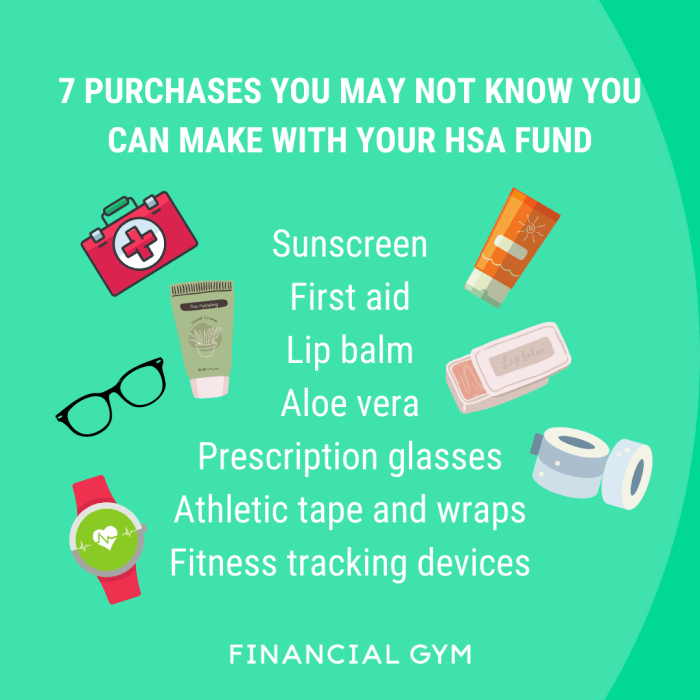The question of whether you can use a Health Savings Account (HSA) to pay for your health insurance premiums is a common one, sparking considerable interest among those seeking to maximize their healthcare savings. Understanding the intricacies of HSA usage, particularly regarding premium payments, requires navigating IRS regulations and discerning eligible expenses. This guide aims to demystify the process, providing a clear and concise overview of HSA eligibility, permitted uses, and potential tax implications related to insurance premium payments.
We will explore the various facets of HSA utilization, from eligibility requirements and compatible insurance plans to the step-by-step process of using HSA funds for eligible expenses, including premiums where applicable. Furthermore, we will address potential penalties for misuse and delve into alternative health savings options for comparison. By the end, you will have a comprehensive understanding of how to leverage your HSA effectively and responsibly.
HSA Eligibility and Insurance Premiums
Health Savings Accounts (HSAs) offer a powerful tool for tax-advantaged savings for healthcare expenses, but eligibility is carefully defined. Understanding the requirements and compatible insurance plans is crucial to maximizing the benefits of an HSA.
HSA Eligibility Requirements
To be eligible to open and contribute to an HSA, you must be enrolled in a High Deductible Health Plan (HDHP) that meets specific IRS guidelines. These guidelines focus on minimum deductible and out-of-pocket maximum amounts. You cannot be covered by other health insurance (except for limited exceptions like a limited-scope supplemental plan). Additionally, you cannot be claimed as a dependent on someone else’s tax return. You must also not be enrolled in Medicare. Finally, you can’t have been claimed as a dependent on someone else’s return in the past year.
Compatible Health Insurance Plans
HSAs are compatible only with High Deductible Health Plans (HDHPs). These plans feature high deductibles (the amount you pay out-of-pocket before insurance coverage begins) and typically lower monthly premiums compared to traditional health insurance plans. The IRS sets minimum deductible and out-of-pocket maximum requirements for an HDHP to qualify for HSA contributions. For 2023, for example, the minimum deductible for an individual was $1,500 and the family deductible was $3,000. These amounts are adjusted annually for inflation. The maximum out-of-pocket expense amounts also vary by plan and individual/family status. It’s crucial to check the plan details to confirm its HSA compatibility.
Comparison of HSA-Qualified Health Plans and Other Health Insurance Options
HSA-qualified plans, being HDHPs, offer lower monthly premiums than traditional plans with lower deductibles. However, this comes with the trade-off of a higher deductible. Traditional plans, such as PPOs and HMOs, generally have lower deductibles and lower out-of-pocket maximums but come with higher monthly premiums. Choosing between an HDHP and a traditional plan depends on individual risk tolerance and financial situation. Someone with a higher risk tolerance and a desire to save for future medical expenses might prefer an HDHP with an HSA, while someone preferring lower immediate costs might opt for a traditional plan.
Tax Advantages of Using an HSA versus Other Health Savings Methods
| Feature | HSA | Flexible Spending Account (FSA) | Health Reimbursement Arrangement (HRA) |
|---|---|---|---|
| Contributions | Pre-tax, tax-deductible | Pre-tax, not tax-deductible | Employer-funded, tax-deductible for employer |
| Growth | Tax-deferred | No growth; use-it-or-lose-it | No growth; employer-controlled |
| Withdrawals for Qualified Medical Expenses | Tax-free | Tax-free | Tax-free |
| Withdrawals for Non-Qualified Medical Expenses | Taxable income + 10% penalty (under 65) | Taxable income | Taxable income |
Using HSA Funds for Insurance Premiums
Health Savings Accounts (HSAs) offer a tax-advantaged way to save for qualified medical expenses. While many understand HSAs can cover doctor visits and prescription drugs, the use of HSA funds for insurance premiums is less clear-cut and depends heavily on the specific type of insurance. This section clarifies the IRS regulations and provides guidance on using HSA funds for premiums.
IRS Regulations Concerning HSA and Insurance Premiums
The IRS allows the use of HSA funds for certain health insurance premiums, but not all. Specifically, HSA funds can be used to pay for premiums of health insurance plans that meet the definition of “minimum essential coverage” under the Affordable Care Act (ACA), but only if those premiums are considered a qualified medical expense. This typically applies to high-deductible health plans (HDHPs) that are paired with an HSA. Crucially, premiums for supplemental insurance, such as dental or vision insurance, are generally not eligible for HSA payment, even if purchased alongside a qualifying HDHP.
Examples of Permitted and Non-Permitted Uses
Permitted: Using HSA funds to pay the monthly premiums for a high-deductible health plan (HDHP) that meets ACA requirements and is paired with your HSA. This is the most common and accepted use. For instance, if John has an HSA and an HDHP with a $5,000 deductible, he can use his HSA funds to pay for his monthly HDHP premiums. This is because the HDHP is considered “minimum essential coverage”.
Not Permitted: Using HSA funds to pay premiums for supplemental insurance policies, such as long-term care insurance, vision insurance, or dental insurance. Even if these policies are obtained alongside the HDHP, the premiums are not considered qualified medical expenses under IRS guidelines. For example, if Sarah uses her HSA funds to pay for her dental insurance premiums, she would be violating IRS rules and may face penalties. The same would apply to premiums for life insurance, disability insurance, or other non-medical coverage.
Tax Implications of Using HSA Funds for Premiums
Using HSA funds for eligible premiums is tax-free. The contributions to the HSA, the growth of the funds within the account, and the withdrawals used for qualified medical expenses, including eligible premiums, are all tax-free. This contrasts sharply with using non-HSA funds to pay for premiums, which would typically not offer this triple tax advantage. However, using HSA funds for ineligible expenses will result in both the distribution being included as taxable income and a 20% additional tax penalty (unless you are over 65 or otherwise meet specific exceptions).
Step-by-Step Guide to Using HSA Funds for Eligible Health Expenses
- Verify Eligibility: Confirm that the insurance premium you intend to pay is for a qualified medical expense, specifically the premiums of a qualifying HDHP. Check your plan documents and IRS guidelines.
- Check HSA Balance: Ensure you have sufficient funds in your HSA to cover the premium payment.
- Choose Payment Method: Most HSA providers offer several payment methods, such as debit card, check, or online transfer. Select your preferred method.
- Make the Payment: Use your chosen method to pay the premium, specifying that the payment is from your HSA.
- Maintain Records: Keep accurate records of the payment, including the date, amount, and the insurance provider’s name, as proof of the qualified medical expense.
Types of Eligible Health Expenses

Using your HSA funds for eligible medical expenses can significantly reduce your out-of-pocket healthcare costs. Understanding which expenses qualify is crucial for maximizing the benefits of your HSA. This section Artikels various categories of eligible health expenses and provides examples to clarify what is and isn’t covered.
Preventive Care
Preventive care aims to prevent illness and disease before they occur. These services are often covered in full or at a lower cost compared to treatment for existing conditions.
- Eligible Expenses: Annual physical exams, vaccinations (flu shot, pneumonia vaccine), routine dental cleanings, vision screenings, mammograms, colonoscopies (when recommended as preventative screenings).
- Ineligible Expenses: Cosmetic procedures (unless medically necessary due to a condition), elective surgeries not related to preventative health.
Diagnosis and Treatment of Illness or Injury
This category encompasses expenses related to diagnosing and treating existing medical conditions or injuries. Reimbursement here often depends on the specific plan and provider.
- Eligible Expenses: Doctor visits for illness or injury, hospital stays, prescription medications, surgery (for illness or injury), lab tests, physical therapy, mental healthcare services, ambulance transportation.
- Ineligible Expenses: Over-the-counter medications (unless prescribed), experimental treatments not covered by insurance, alternative therapies not medically recognized.
Prescription Medications
Prescription drugs are a significant healthcare cost for many individuals. HSAs can help offset these expenses.
- Eligible Expenses: Medications prescribed by a licensed physician, insulin, inhalers, allergy medications (if prescribed).
- Ineligible Expenses: Over-the-counter medications (unless prescribed), vitamins and supplements (unless prescribed for a specific medical condition).
Medical Devices and Equipment
Certain medical devices and equipment are eligible for HSA reimbursement, provided they are medically necessary.
- Eligible Expenses: Crutches, wheelchairs, walkers, diabetic supplies (glucose monitors, test strips), CPAP machines (with a prescription), hearing aids (with a prescription).
- Ineligible Expenses: Cosmetic enhancements (unless medically necessary), fitness trackers, general wellness devices.
Reimbursement Process Comparison
The reimbursement process is generally similar across eligible expense categories. You typically pay for the expense upfront, then submit a claim to your HSA administrator with receipts and supporting documentation. The administrator then processes the claim and reimburses you from your HSA account. However, some providers may allow direct billing to your HSA, eliminating the need for upfront payment and subsequent reimbursement. The speed of reimbursement can vary depending on the HSA administrator and the complexity of the claim. For instance, a simple claim for a prescription might be processed quickly, while a more complex claim for a hospital stay may take longer.
Potential Penalties and Implications

Misusing your Health Savings Account (HSA) funds can lead to significant tax penalties and other repercussions. Understanding these potential consequences is crucial to ensure responsible HSA management. This section details the penalties for ineligible expenses, the tax implications of non-qualified withdrawals, and the process for correcting errors.
Penalties for Misusing HSA Funds
Using HSA funds for non-qualified medical expenses results in unfavorable tax consequences. The IRS considers these withdrawals as taxable income, subject to both income tax and a 20% additional tax penalty. There are exceptions to this penalty, such as cases of hardship or after age 65, where only the income tax applies. For example, if you withdraw $1,000 for a vacation, you’ll owe income tax on that $1,000 plus an additional $200 penalty. The exact amount of income tax will depend on your individual tax bracket.
Tax Implications of Non-Qualified Withdrawals
The tax implications of withdrawing HSA funds for non-qualified expenses are straightforward: the withdrawn amount is considered taxable income in the year of withdrawal. This means it’s added to your other income for tax purposes, potentially pushing you into a higher tax bracket and increasing your overall tax liability. Furthermore, the additional 10% penalty applies unless an exception applies (like age 65 or older, or certain hardship situations). This penalty is in addition to the regular income tax you would owe on the withdrawal. For instance, if you withdraw $5,000 for a non-qualified expense and are in the 22% tax bracket, you would owe income tax on the $5,000 plus the additional 20% penalty.
Correcting Errors in HSA Usage
If you mistakenly use HSA funds for non-qualified expenses, you can take steps to rectify the situation. The best course of action is to promptly report the error to the HSA administrator. They may allow you to return the funds to your HSA, avoiding the tax penalties. However, if this isn’t possible, you will need to pay the income tax and potential penalties when you file your taxes. Accurate record-keeping is essential to prevent such errors. Maintaining detailed records of all HSA transactions will facilitate a smoother correction process if needed.
Flowchart for Using HSA Funds for Healthcare Expenses
The following flowchart Artikels the decision-making process when considering using HSA funds for healthcare expenses, including insurance premiums:
[A textual representation of a flowchart follows. Visual representation would be ideal, but is not requested.]
Start –> Is the expense a qualified medical expense (as defined by the IRS)? –> Yes –> Use HSA funds –> End
|
No –> Is the expense for insurance premiums? –> Yes –> Is the individual HSA eligible? –> Yes –> Use HSA funds –> End
|
No –> Do not use HSA funds –> End
|
No –> Do not use HSA funds –> End
Alternative Health Savings Options

Choosing a health savings plan can be complex, as several options exist with varying benefits and drawbacks. This section compares and contrasts Health Savings Accounts (HSAs) with Flexible Spending Accounts (FSAs), highlighting their key differences to help you determine which best suits your individual needs.
HSA versus FSA: A Comparison
HSAs and FSAs both offer tax advantages for paying medical expenses, but they differ significantly in their structure and usage. Understanding these differences is crucial for making an informed decision. HSAs are owned by the individual and funds roll over year to year, offering long-term savings potential. FSAs, on the other hand, are employer-sponsored and typically have a “use it or lose it” provision, meaning unused funds are forfeited at the end of the plan year.
Advantages and Disadvantages of HSAs and FSAs
HSAs offer several advantages, including the portability of funds between employers and the potential for investment growth. However, they require a high-deductible health plan, which can result in higher out-of-pocket costs upfront. FSAs, while convenient due to employer administration, lack portability and offer limited investment options. The “use it or lose it” aspect also presents a risk of losing funds if not fully utilized.
Key Differences Between HSAs and FSAs
| Feature | HSA | FSA |
|---|---|---|
| Ownership | Individual | Employer-sponsored |
| Portability | Portable between employers | Not portable |
| Rollover | Funds roll over year to year | Generally, “use it or lose it” |
| Investment Options | Investment options available | Limited or no investment options |
Situations Favoring HSAs or FSAs
An HSA is generally preferable for individuals who are healthy, have a high deductible health plan, and are comfortable with higher upfront costs in exchange for long-term savings and investment potential. For example, a young, healthy individual planning for retirement might find an HSA particularly advantageous. Conversely, an FSA might be a better choice for individuals with predictable, moderate healthcare expenses who prefer the convenience of employer-sponsored plans and don’t mind the “use it or lose it” provision. For instance, an employee with a known need for routine vision or dental care might benefit from an FSA to cover those expenses.
End of Discussion
Successfully navigating the world of HSAs and understanding their application to insurance premiums requires careful consideration of IRS guidelines and a thorough understanding of eligible expenses. While HSAs offer significant tax advantages and potential long-term savings, improper use can lead to penalties. This guide has provided a framework for understanding HSA eligibility, permitted uses for premiums, and the importance of responsible financial planning. Remember to consult with a qualified financial advisor or tax professional for personalized guidance tailored to your specific circumstances.
FAQ
Can I use my HSA to pay for my spouse’s insurance premiums?
Generally, no. HSA funds can only be used to pay for your own qualified medical expenses, unless your spouse is also covered under your plan and the expenses are for them.
What happens if I use my HSA for ineligible expenses?
You will be subject to income tax on the amount withdrawn for ineligible expenses, plus a 20% penalty, unless you are over age 65 or meet other specific exceptions.
Are there any income limits for contributing to an HSA?
Yes, there are annual contribution limits set by the IRS, and eligibility is also tied to having a high-deductible health plan (HDHP).
Can I use my HSA for dental or vision expenses?
Yes, many dental and vision expenses are eligible for reimbursement from an HSA, provided they meet the definition of qualified medical expenses.